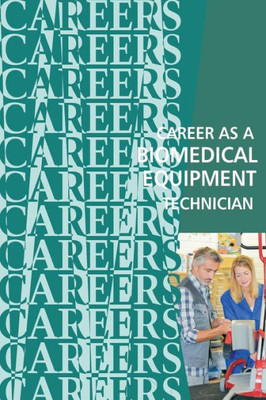
Career as a Biomedical Equipment Technician
CreateSpace Independent Publishing Platform
ISBN13:
9781717284334
$13.63
EVERY DAY, COUNTLESS LIVES DEPEND on life-saving medical apparatus. Hospital rooms, surgery suites, and emergency rooms are filled with technological wonders like defibrillators, ventilators, and heart monitors. If any one of these machines breaks down, a person's life could be at risk. Keeping them up and running properly is the responsibility of biomedical equipment technicians. These professionals, also known as BMETS, are highly skilled in the installation and repair of a wide variety of modern medical equipment. Some biomedical equipment technicians have generalized skills, while others specialize in particular types of equipment. Generalists are trained to install, inspect, test, calibrate, maintain, repair, and sometimes modify all kinds of biomedical equipment. Junior technicians may start by repairing hydraulic chairs and beds, performing routine maintenance like cleaning monitors, or doing simple calibrations. More experienced BMETs are able to troubleshoot and repair more complex equipment, such as electrosurgical units and anesthesia machines. There are also specialists who work solely on apparatus like dialysis machines, ultrasound scanners, or surgical robots. Biomedical equipment technicians spend much of their time working hands-on with machines and equipment, but they often have other duties. They may perform some administrative duties like maintaining inventories of parts and components, reviewing product manuals, reordering supplies, and keeping records of maintenance and repair jobs. Those who install new equipment may need to train medical staff how to use it. When medical devices are to be used at home, it may be the BMET who instructs the patient in the use and care of the equipment. Most biomedical equipment technicians work in hospitals or clinics. Others work in laboratories or manufacturers' facilities. Wherever they work, the environment is exceptionally clean and well equipped. The hours are generally steady, but it is common for BMETs to be on call around the clock for one week out of the month. However, because medical equipment is well maintained, after-hours emergency repair calls do not come often. It is possible to enter this field with only a high school diploma. Newcomers who have done well in math and science classes may be offered on-the-job training to perform simple tasks. However, most employers prefer candidates with an associate degree. Technicians who have graduated from a biomedical equipment technology or engineering program will have the knowledge and skills to work on most types of medical equipment. They are also eligible to become certified. Certification is voluntary, but it increases your chances of employment and advancement. BMETs who intend to specialize in more sophisticated equipment, such as imaging equipment or laboratory equipment, usually need a bachelor's degree. A career as a biomedical equipment technician is a good choice for individuals with a mechanical aptitude and an interest in working with the latest technology. It is a constantly changing field that continues to advance in complexity. If you enjoy working with your hands, solving problems, and the idea of spending your days in a medical environment, this may be the career for you.
- | Author: Institute for Career Research
- | Publisher: CreateSpace Independent Publishing Platform
- | Publication Date: Apr 21, 2018
- | Number of Pages: 36 pages
- | Language: English
- | Binding: Paperback
- | ISBN-10: 1717284337
- | ISBN-13: 9781717284334
- Author:
- Institute for Career Research
- Publisher:
- CreateSpace Independent Publishing Platform
- Publication Date:
- Apr 21, 2018
- Number of pages:
- 36 pages
- Language:
- English
- Binding:
- Paperback
- ISBN-10:
- 1717284337
- ISBN-13:
- 9781717284334



